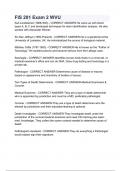Fis 201 exam 2 - Study guides, Class notes & Summaries
Looking for the best study guides, study notes and summaries about Fis 201 exam 2? On this page you'll find 36 study documents about Fis 201 exam 2.
Page 2 out of 36 results
Sort by
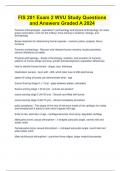
-
FIS 201 Exam 2 WVU Study Questions and Answers Graded A 2024
- Exam (elaborations) • 7 pages • 2024
-
Available in package deal
-
- $13.49
- + learn more
Forensic anthropologist - specialize in archaeology and physical anthropology; do mass grave exhumation, work for the military; have training in anatomy, biology, and archaeology Bones important for determining human species - cranium, pelvis, scapula, femur, humerus Forensic archaeology - Recover and interpret human remains; locate gravesites, remove skeletons out safely Physical anthropology - Study of the biology, variation, and evolution of humans; patterns of human shape and size, ...
FIS 201 Exam 2 WVU with complete solution
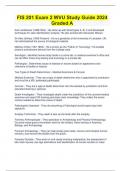
-
FIS 201 Exam 2 WVU Study Guide 2024 Graded A
- Exam (elaborations) • 5 pages • 2024
-
Available in package deal
-
- $13.49
- + learn more
Karl Landsteiner (1868-!943) - He came up with blood types A, B, C and developed techniques for stain identification analysis. He also worked with Alexander Weiner. Sir Alec Jeffreys (1950-Present) - He is a geneticist at the University of Leicester, UK. He individualized the source of biological material. Mathieu Orfila () - He is known as the "Father of Toxicology." He studied poisons and became famous from the Lafarge case. Serologist - Identifies human body fluids in a crime lab. ...
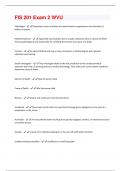
-
FIS 201 Exam 2 WVU Questions And Answers Solved 100% Correct!!
- Exam (elaborations) • 16 pages • 2024
- Available in package deal
-
- $7.99
- + learn more
FIS 201 Exam 2 WVU Pathologist - Determines cause of disease or trauma based on appearance and chemistry of bodies or tissues. Medical Examiner - Appointed by jurisdiction and is usually a physician who is a board-certified forensic pathologist and is responsible for certifying the manner and cause of a death. Coroner - An elected official and may or may not possess a medical degree with optional education and training. Death Investigator - They investigate death under the jurisdiction of...
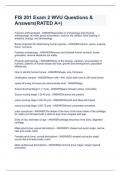
-
FIS 201 Exam 2 WVU Questions & Answers(RATED A+)
- Exam (elaborations) • 7 pages • 2024
-
- $11.49
- + learn more
Forensic anthropologist - ANSWERspecialize in archaeology and physical anthropology; do mass grave exhumation, work for the military; have training in anatomy, biology, and archaeology Bones important for determining human species - ANSWERcranium, pelvis, scapula, femur, humerus Forensic archaeology - ANSWERRecover and interpret human remains; locate gravesites, remove skeletons out safely Physical anthropology - ANSWERStudy of the biology, variation, and evolution of humans; patterns o...
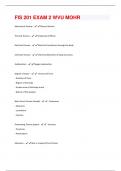
-
FIS 201 EXAM 2 WVU MOHR Questions & Answers Already Graded A+
- Exam (elaborations) • 16 pages • 2024
- Available in package deal
-
- $7.99
- + learn more
Mechanical Trauma - Physical Actions Thermal Trauma - Temperature Effects Electrical Trauma - Electrical Conduction through the body Chemical Trauma - Chemical Alteration of body processes Asphyxiation - Oxygen deprivation Degree of Injury - - Amount of force - Duration of force - Region of the body - Surface area of the body struck - Nature of the weapon Blunt Force Trauma (closed) - - Contusions - Abrasions - Lacerations - Fracture Penetrating Trauma (open) - - Incisions - Punct...
WVU FIS 201 Exam 2 questions & answers

-
FIS 201 Exam 2 WVU Questions With 100% Correct
- Exam (elaborations) • 9 pages • 2024
- Available in package deal
-
- $6.69
- + learn more
Forensic anthropologist - specialize in archaeology and physical anthropology; do mass grave exhumation, work for the military; have training in anatomy, biology, and archaeology Bones important for determining human species - cranium, pelvis, scapula, femur, humerus Forensic archaeology - Recover and interpret human remains; locate gravesites, remove skeletons out safely Physical anthropology - Study of the biology, variation, and evolution of humans; patterns of human shape and size, gro...
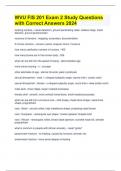
-
WVU FIS 201 Exam 2 Study Questions with Correct Answers 2024
- Exam (elaborations) • 3 pages • 2024
-
Available in package deal
-
- $11.99
- + learn more
locating remains - visual detection, ground penetrating radar, cadaver dogs, metal detector, ground penetrometer recovery of remains - mapping, excavation, documentation 5 human remains - cranium, pelvis, scapula, femur, humerus how many ossification centers in humans - 405 how many bones are in the human body - 206 what can we tell from the speed of fusing - demonstrates age more suture scoring --> - younger other estimates of age - sternal rib ends, pubic symphysis s...
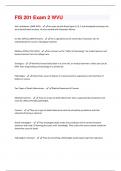
-
FIS 201 Exam 2 WVU Questions And Answers.
- Exam (elaborations) • 7 pages • 2024
- Available in package deal
-
- $7.99
- + learn more
Karl Landsteiner (1868-!943) - He came up with blood types A, B, C and developed techniques for stain identification analysis. He also worked with Alexander Weiner. Sir Alec Jeffreys (1950-Present) - He is a geneticist at the University of Leicester, UK. He individualized the source of biological material. Mathieu Orfila () - He is known as the "Father of Toxicology." He studied poisons and became famous from the Lafarge case. Serologist - Identifies human body fluids in a crime lab. or ...

How did he do that? By selling his study resources on Stuvia. Try it yourself! Discover all about earning on Stuvia

